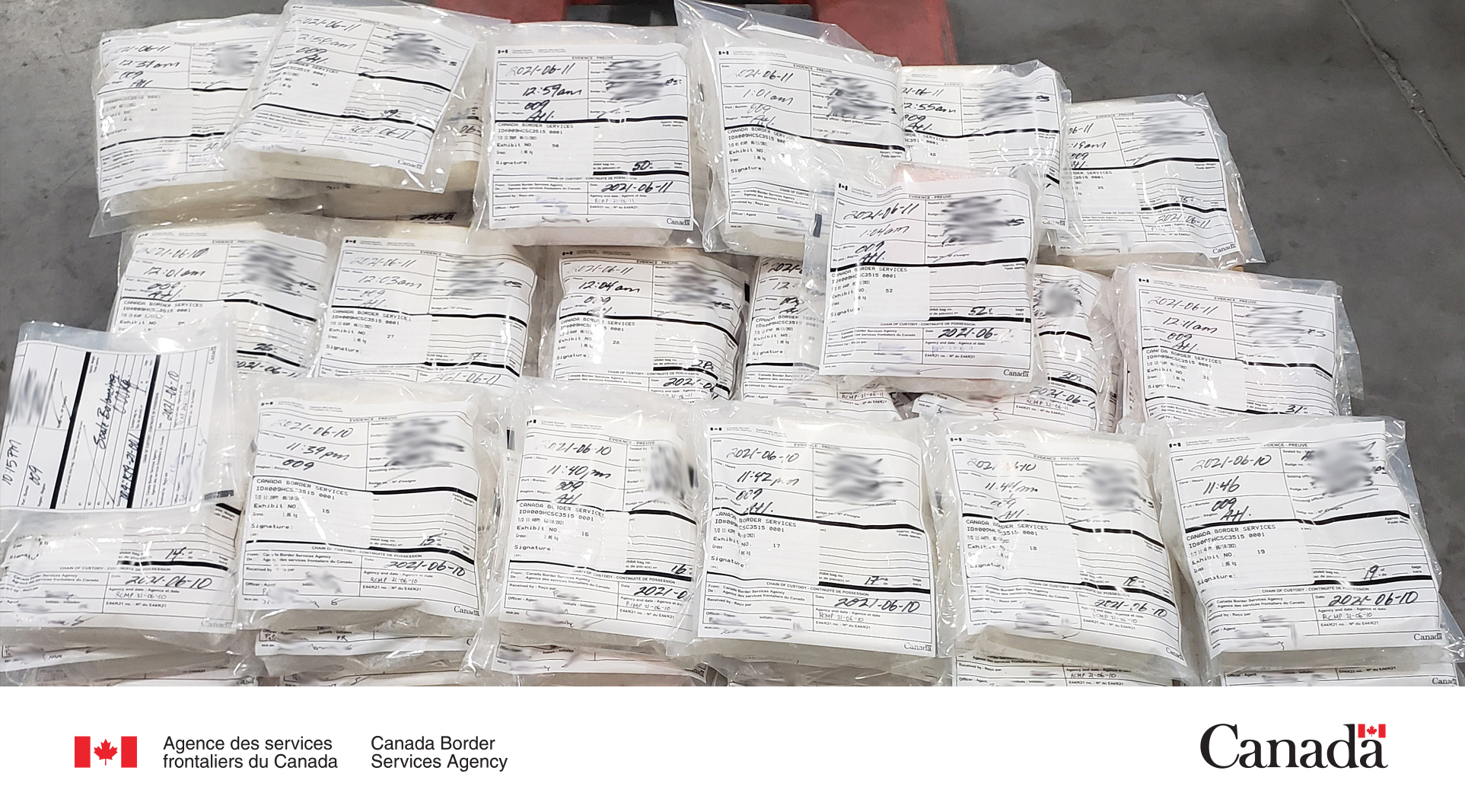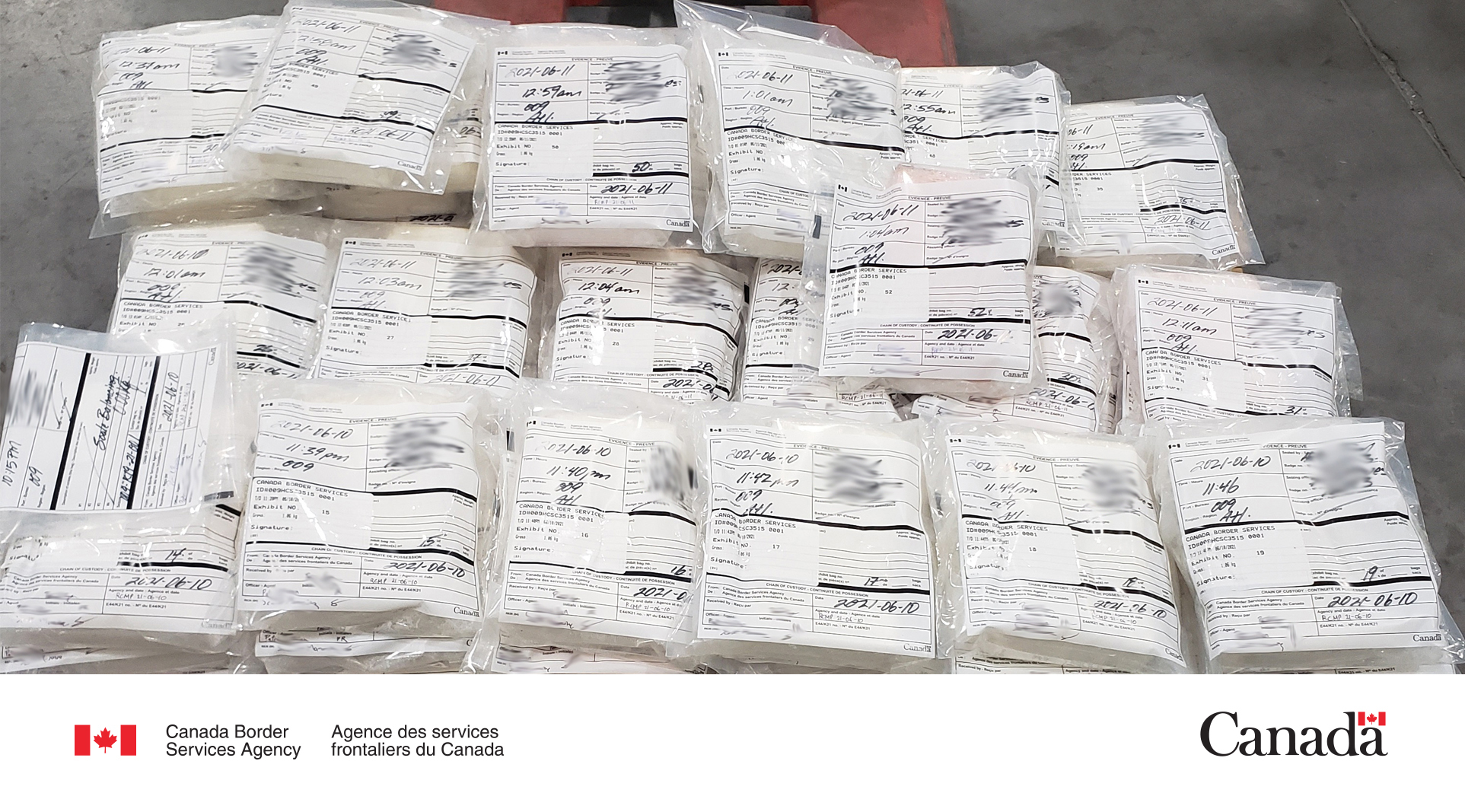**** CBSA Media Release
CBSA Atlantic Region – Operational and enforcement highlights from 2021

The Canada Border Services Agency (CBSA) Atlantic Region released operational and enforcement highlights covering the period from January 1 to October 31, 2021.
The Atlantic Region is home to over 150 service locations including 18 land ports of entry, 28 commercial marine sites, 26 airports, two ferry terminals and a number of telephone reporting sites. The Region consists of three districts (Southern New Brunswick and Prince Edward Island District; Northwest New Brunswick District; Newfoundland, Labrador and Nova Scotia District) and two divisions (Intelligence and Enforcement Operations; Corporate, Programs and Integration Management).
Keeping our communities safe
On June 10, CBSA officers examined a shipping container at the Port of Halifax in Nova Scotia. As a result of this examination, 54.7 kilograms of suspected cocaine was seized by officers. The CBSA estimates this seizure to be valued at approximately $6.8 million.
In June, following several interceptions and seizures of prohibited weapons through the postal stream in 2020 and 2021, CBSA officers in New Brunswick executed a search warrant where a conductive energy weapon was found. Through an investigation, it was determined that the individual had attempted to import nine switchblades, one push dagger and one conductive energy device through international mail. The individual was arrested and interviewed by CBSA criminal investigators. The matter remains under investigation.

In July, Border Services Officers at the Port of Clair, New Brunswick, referred a traveller for a secondary examination. The referral and subsequent search of the vehicle led to the seizure of an undeclared restricted handgun. The traveller was arrested by CBSA officers and issued a $1,000 penalty.
In August, CBSA officers at the Edmundston, New Brunswick, port of entry seized an undeclared stun gun. Within the same week, officers at the Woodstock, New Brunswick port of entry seized another undeclared stun gun. Stun guns are considered prohibited weapons in Canada and resulted in a $500 penalty for each traveller.
On September 4, at the St. Stephen Third Bridge port of entry in New Brunswick, officers discovered psilocybin mushrooms while searching a camper van. Through a detailed examination, they were able to locate and seize 32.1 grams of psilocybin mushrooms. The individual was arrested and later released with a $1,100 penalty.
On September 10, at the St. Stephen Third Bridge port of entry in New Brunswick, a camper belonging to two United States citizens who were on their way to go camping in Nova Scotia, was sent for a secondary examination. During the examination, officers discovered a prohibited spring-loaded blade and a prohibited handgun. The weapons were seized, a $1,500 penalty was issued and the travellers were denied entry into Canada.
In October, Halifax Commercial Operations referred a suspicious import shipment for further examination. The examination was conducted by the Waterfront Cargo Inspection Unit (WCIU) and resulted in the discovery and seizure of an undeclared handgun and oversized magazines.
CBSA officers at the Ports of Saint John and Halifax intercepted 52 stolen vehicles destined for overseas markets this year, with a total value of $2,552,000. Vehicle types included pick-up trucks, cars, SUVs and various luxury vehicles. All vehicles were turned over to local police for further investigation.
Although just outside of the reporting period, in addition to the total stolen vehicle interceptions reported above, CBSA officers at the Port of Halifax intercepted an additional 26 stolen vehicles during the first week of November. These vehicles are estimated to be worth over $1,700,000.
Facilitating a strong economy
CBSA officers in the Atlantic Region processed approximately 117,750 commercial trucks, and 142,918 shipping containers from January to October 2021. Over the same time period, CBSA officers in the Atlantic Region facilitated the arrival of 369,224 travellers.
On August 11, CBSA officers in Fortune, Newfoundland and Labrador welcomed the first passenger ferry from Saint-Pierre-et-Miquelon after an 18-month pause in passenger crossings, due to the COVID-19 pandemic and related travel restrictions. This also marked the first arrival of passenger vehicles on the ferry, following the completion of a new vehicle ramp at the Fortune wharf. The ferry made its trip with 47 passengers and 16 vehicles.
The CBSA collects customs duties as a way to protect certain sectors of the Canadian economy. The CBSA also uses Administrative Monetary Penalty System (AMPS) to issue monetary penalties to commercial clients for violating CBSA’s trade and border legislation, such as failure to pay duties. For instance, on June 7, at the Ferry Point port of entry in St. Stephen, New Brunswick, two Canadian citizens returning from the United States were referred for a secondary examination, during which officers discovered two empty luxury watch boxes and authenticity tags along with a high-end designer purse. Through a comprehensive interview, the officers determined that the travellers were each wearing a luxury watch, and that the watches were acquired in Florida. As a result of the investigation, the goods were seized under the Customs Act, with a term of release of $11,600.64. In comparison, had the travellers declared these goods, they would have paid $5,800.32 in duties and taxes.
Supporting other government departments
On March 6, Border Services Officers were dispatched from Saint John, New Brunswick, and Halifax, Nova Scotia, to Lamèque, New Brunswick after receiving a request from the RCMP to assist in the recovery operation of a missing 29-year-old snowmobiler. The CBSA team used a Remotely Operated Vehicle (ROV) to assist in locating the snowmobiler in Lamèque Bay, which was covered with 45 centimetres of ice. The CBSA, using the ROV, were able to assist in locating and recovering the victim. This exemplifies the continued cooperation between the CBSA and the RCMP.
In April, CBSA investigators in Nova Scotia laid charges following a joint investigation with the Canadian Food Inspection Agency (CFIA) into Atlantic ChiCan Seafood, a Nova Scotia based seafood plant. In collaboration with CFIA, the CBSA investigated allegations that Atlantic ChiCan Seafood was importing live lobster from the U.S. and exporting it to foreign markets as “Product of Canada”. The CBSA investigated and laid three charges under the Customs Act section 153(a) for making false statements regarding the origin, weight and value of exported goods (lobster). The CFIA’s investigation resulted in additional charges being laid under the Safe Food for Canadians Act. This matter is now before the courts.
In July, the Intelligence and Enforcement Operations Division received information related to an identity fraud investigation involving a person living in southern New Brunswick. The CBSA investigation determined that there was an outstanding immigration warrant for the individual. Further investigation also revealed that the individual used a genuine passport to obtain an Ontario driver’s license in 2011 under an alias. It was also determined that the individual used at least two genuine passports to obtain additional fraudulent documents. A referral was made to CBSA Atlantic Region’s Inland Enforcement Unit who arrested the individual in August 2021. The individual was later removed from Canada.
Associated Links
- Accomplishments by the numbers: Year in review
- COVID-19: Summary data about travellers, testing and compliance
- Canada Border Services Agency seizures



